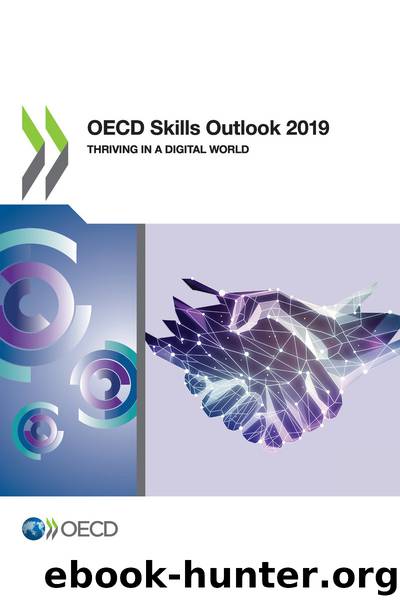OECD Skills Outlook 2019 by OECD

Author:OECD
Language: eng
Format: epub
Tags: employment/science/education
Publisher: OECD Publishing
Published: 2019-05-09T00:00:00+00:00
The Internet also provides people with a new arena in which to engage in civic and political debates, to exchange ideas and to voice frustration (OECD, 2019[4]). In 2017, 11% of people in the European Union expressed opinions on civic or political issues via websites (e.g. blogs and social media). Across the OECD countries, several governments use ICTs to engage citizens not only to facilitate voting but also throughout the regulatory process (OECD, 2019[10]). The most frequent purpose is to gather feedback from the public on draft regulations and plans to change existing regulations. In parallel, civil and political participation is also affected by the Internet as an alternative information channel to the traditional media. The Internet shapes voters’ exposure to information and voter turnout under certain conditions (Falck, Gold and Heblich, 2014[9]; Campante, Durante and Sobbrio, 2018[8]).
Many activities that were previously conducted in person, such as paying taxes or consulting a medical practitioner, are being progressively digitalised. Digitalisation offers easier access to services and goods, but also raises challenges in terms of inclusion: all individuals are not equally likely to take part in many of these new activities, especially as levels of trust in online environments vary. Young people engage more in many of these new online activities, as do those with tertiary education (Figure 4.3).
Download
This site does not store any files on its server. We only index and link to content provided by other sites. Please contact the content providers to delete copyright contents if any and email us, we'll remove relevant links or contents immediately.
International Integration of the Brazilian Economy by Elias C. Grivoyannis(111057)
The Radium Girls by Kate Moore(12028)
Turbulence by E. J. Noyes(8047)
Nudge - Improving Decisions about Health, Wealth, and Happiness by Thaler Sunstein(7706)
The Black Swan by Nassim Nicholas Taleb(7128)
Rich Dad Poor Dad by Robert T. Kiyosaki(6632)
Pioneering Portfolio Management by David F. Swensen(6300)
Man-made Catastrophes and Risk Information Concealment by Dmitry Chernov & Didier Sornette(6019)
Zero to One by Peter Thiel(5801)
Secrecy World by Jake Bernstein(4752)
Millionaire: The Philanderer, Gambler, and Duelist Who Invented Modern Finance by Janet Gleeson(4478)
The Age of Surveillance Capitalism by Shoshana Zuboff(4291)
Skin in the Game by Nassim Nicholas Taleb(4248)
The Money Culture by Michael Lewis(4207)
Bullshit Jobs by David Graeber(4190)
Skin in the Game: Hidden Asymmetries in Daily Life by Nassim Nicholas Taleb(4004)
The Dhandho Investor by Mohnish Pabrai(3764)
The Wisdom of Finance by Mihir Desai(3746)
Blockchain Basics by Daniel Drescher(3581)
